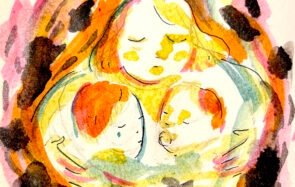My family lives on a short, one-way block that many people use as a cut-through to a more major road. Never mind that at the end of the block there sits our neighborhood elementary school, said drivers regularly violate the 35 mph speed limit.
Even more concerning to me of late is another egregious driving behavior: Honking. You see, it is me who is the target of the car horn symphony, sometimes in the morning, sometimes in the afternoon, and sometimes twice a day.
Those are the times when a small van pulls up in front of our home to pick up or drop off my son, who has autism, and drive him to his amazing specialized school, 15 minutes away.
Generally, in good weather, we are sitting and waiting for my son’s van on the front porch. Then it takes us maybe 20 seconds to walk down to the curb. Perhaps it’s only the fourth car back who can’t see my son walking to the bus that begins to beep insistently. But with a child who has special needs, sometimes things take just a little longer than expected.
READ: When My Daughter is More Than Her Autism
Maybe we’re waiting and the bus is late and my son needs to use the bathroom again—once he’s on the toilet, the van will naturally arrive. Maybe, because of his compulsive tendencies, he needs to run inside one more time to make sure that my phone is plugged into the charger. Maybe he’s in a state of mind that being home seems more fun than going to school, so he’ll choose to stay seated when the van arrives, despite my urging to get up.
Given any of those circumstances—the honking begins. I decided to do an experiment this week to see how long it took, when we weren’t 100% ready and waiting on the porch, to get my son to the van. In any of the circumstances I describe above, the longest amount of time it took us to get outside to the van was 1 minute and 7 seconds.
And yet, by the fury of the beeping, you would think that we had blocked off the road for hours for the Queen of Elkins Park (our suburban Philadelphia hamlet) herself.
I used to do the “I can’t see you thing” to the rows of cars waiting for my son to get on or off his school van. If I didn’t look at them, I could better stay in the positive bubble that I work hard to create and not take in their aggression.
READ: A Note to Autism Families: It Gets Better
But something in me has shifted this week, since I registered the actual inconvenience that we’re causing the drivers who cut-through on our street. I’m not willing to ignore these rude people. Now I stand and look at them—I look right in their windows after my son’s van leaves. I watch them watching me blow kisses, smile, and wave to my son. I stand at the curb and watch the entire line of cars who were beeping down the block pass me and I make eye contact with the drivers who are brave enough to look back. These are well-dressed people, driving nice cars, headed to the office—who haven’t taken a moment to think that maybe they are being held up because another human being needs just a little bit of support.
I am inviting them to look me in the eye and register to see our life. Have they ever stopped to consider the amount of patience it takes for the person who has a disability to get through their day—let alone get on and off their mode of transportation?
Years ago, a spiritual teacher of mine taught me to say a prayer or send positive energy whenever I saw an ambulance—it doesn’t matter whether I know the person who is in that ambulance or not. They need love in that moment—and doing that spiritual practice reminds me of our Jewish tradition, of saying the shema, of feeling one God, one life force connecting us all. It reminds me that in our Jewish tradition, when one life is saved, it is as if the world is saved.
READ: My Child With Autism is Going to Jewish Day School (And It’s Working!)
So I’m inviting you all—the good people reading this blog—to be lovers, not honkers. Next time, when you are stopped because a person with a disability needs a few more minutes to get in or off their transportation, could you send them love? Appreciation for their patience? Recognition of their resilience?
As for me, I’ll be hanging out, twice a day, at the curb, with a smile, a kiss, and a wave.








